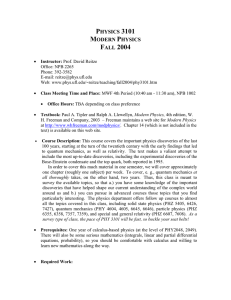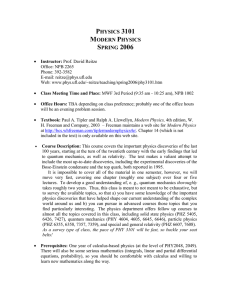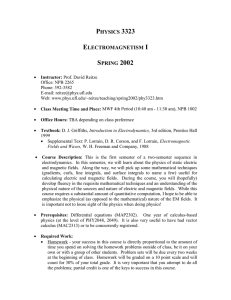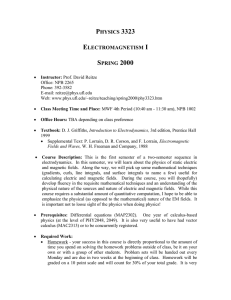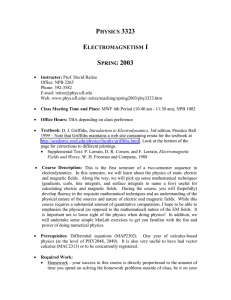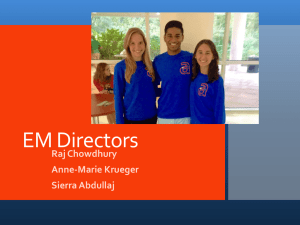P 3101 M
advertisement
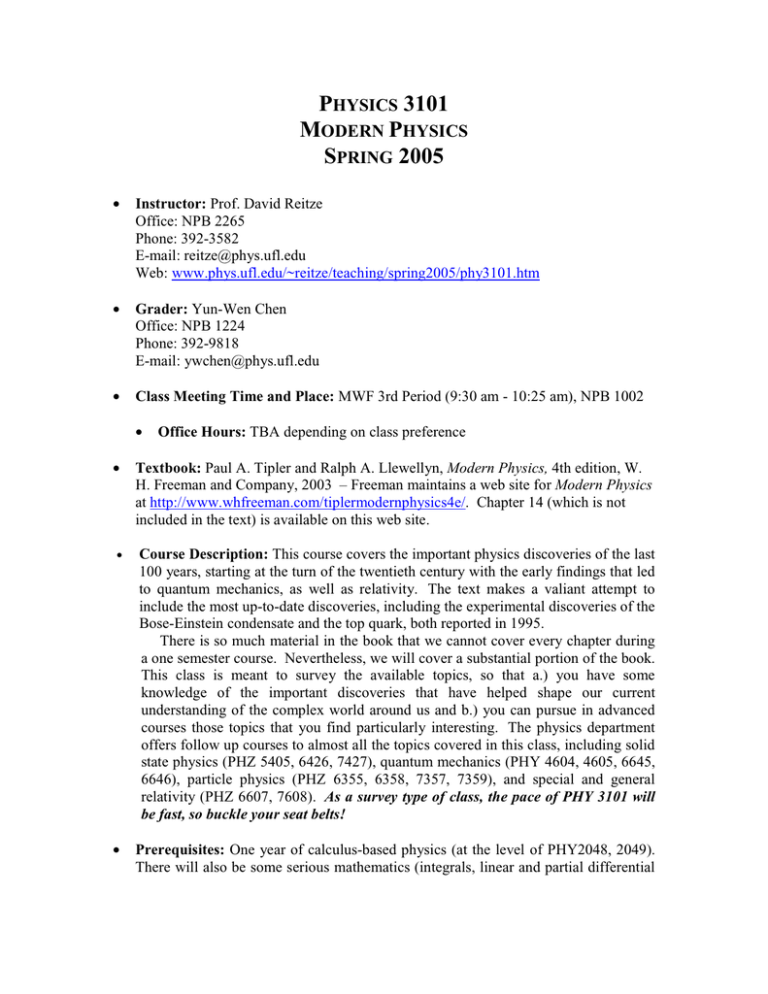
PHYSICS 3101 MODERN PHYSICS SPRING 2005 • Instructor: Prof. David Reitze Office: NPB 2265 Phone: 392-3582 E-mail: reitze@phys.ufl.edu Web: www.phys.ufl.edu/~reitze/teaching/spring2005/phy3101.htm • Grader: Yun-Wen Chen Office: NPB 1224 Phone: 392-9818 E-mail: ywchen@phys.ufl.edu • Class Meeting Time and Place: MWF 3rd Period (9:30 am - 10:25 am), NPB 1002 • Office Hours: TBA depending on class preference • Textbook: Paul A. Tipler and Ralph A. Llewellyn, Modern Physics, 4th edition, W. H. Freeman and Company, 2003 – Freeman maintains a web site for Modern Physics at http://www.whfreeman.com/tiplermodernphysics4e/. Chapter 14 (which is not included in the text) is available on this web site. • Course Description: This course covers the important physics discoveries of the last 100 years, starting at the turn of the twentieth century with the early findings that led to quantum mechanics, as well as relativity. The text makes a valiant attempt to include the most up-to-date discoveries, including the experimental discoveries of the Bose-Einstein condensate and the top quark, both reported in 1995. There is so much material in the book that we cannot cover every chapter during a one semester course. Nevertheless, we will cover a substantial portion of the book. This class is meant to survey the available topics, so that a.) you have some knowledge of the important discoveries that have helped shape our current understanding of the complex world around us and b.) you can pursue in advanced courses those topics that you find particularly interesting. The physics department offers follow up courses to almost all the topics covered in this class, including solid state physics (PHZ 5405, 6426, 7427), quantum mechanics (PHY 4604, 4605, 6645, 6646), particle physics (PHZ 6355, 6358, 7357, 7359), and special and general relativity (PHZ 6607, 7608). As a survey type of class, the pace of PHY 3101 will be fast, so buckle your seat belts! • Prerequisites: One year of calculus-based physics (at the level of PHY2048, 2049). There will also be some serious mathematics (integrals, linear and partial differential equations, probability), so you should be comfortable with calculus and willing to learn new mathematics along the way. • Required Work: • Homework - your success in this course is directly proportional to the amount of time you spend on solving the homework problems outside of class, be it on your own or with a group of other students. Problem sets will be due every week at the beginning of class. Homework will count for 30% of your total grade. There are 13 assignments for the semester; I will use the best 10 of them to compute your final homework grade. It is very important that you attempt to do all the problems; partial credit is one of the keys to success in this course. Late Homework – Since I am dropping the lowest three homework grades, no late homework will be accepted. • Tests - There will be two midterms and a final examination Test 1 Test 2 Final Exam Friday, February 11 Friday, March 25 Thursday, April 28 Venue TBA Venue TBA Venue TBA You are allowed to bring a calculator and one 8 1/2" x 11" formula sheet to the exams (two sheets for the final exam). If you must miss the exam because of a valid reason, you must provide written proof. You will be allowed to take a make-up exam during dead week. • Grades: Your grade will be calculated as follows: Test 1 20% Test 2 20% Final Exam 30% Homework 30% Final letter grades will be assigned based on the distribution of grades at the end of class. Based on prior experience, grades will be given roughly as follows: Score 95 85 80 70 65 60 55 50 Grade A+ A B+ B C+ C D+ D • Students with diabilities and Honor Code - The University now requires the following statements to be included in course syllabi: 1.) "Students with disabilities requesting classroom accommodation must first register with the Dean of Students Office. The Dean of Students Office will provide documentation to the student who must then provide this documentation to the Instructor when requesting accommodation." 2.) "I understand that the University of Florida expects its students to be honest in all their academic work. I agree to adhere to this commitment to academic honesty and understand that my failure to comply with this commitment may result in disciplinary action up to and including expulsion from the University."
